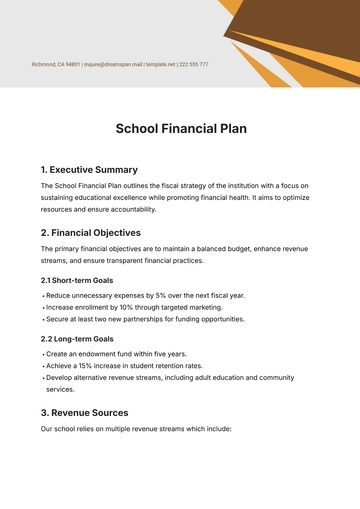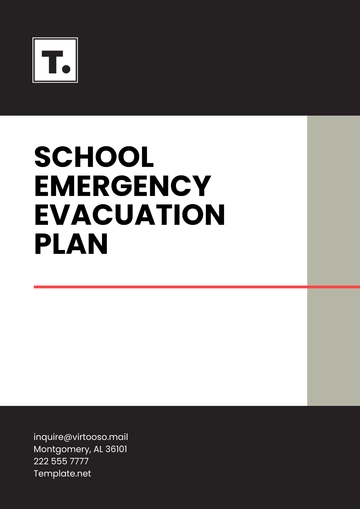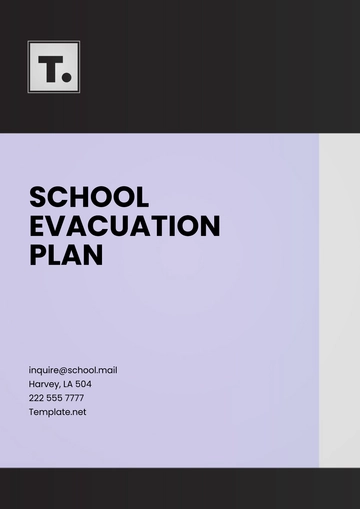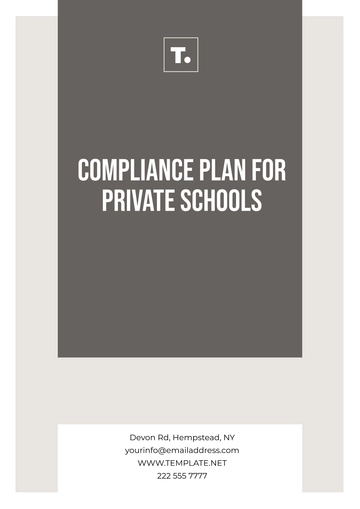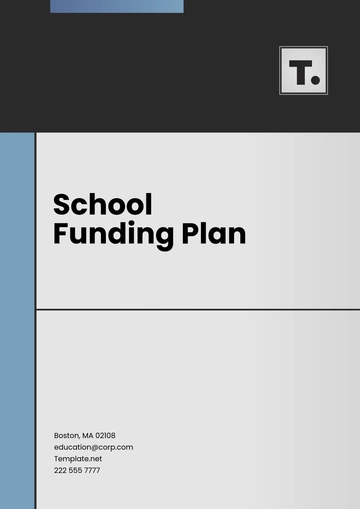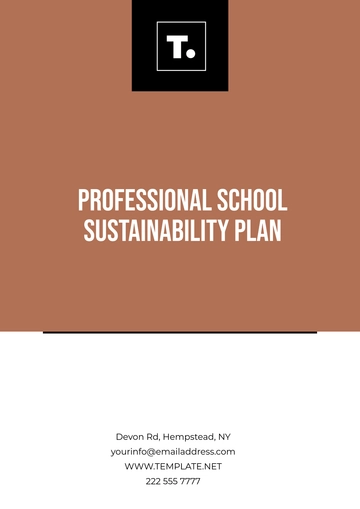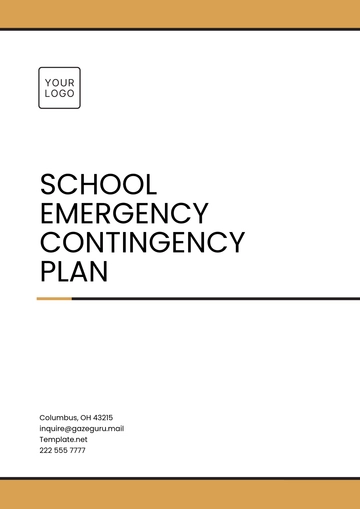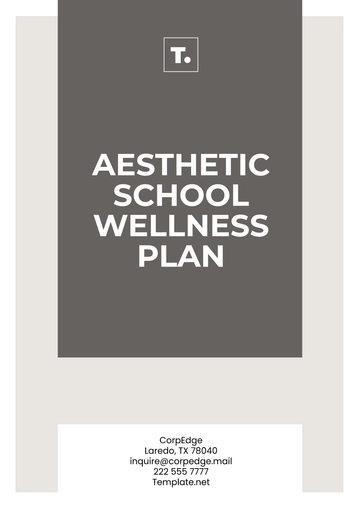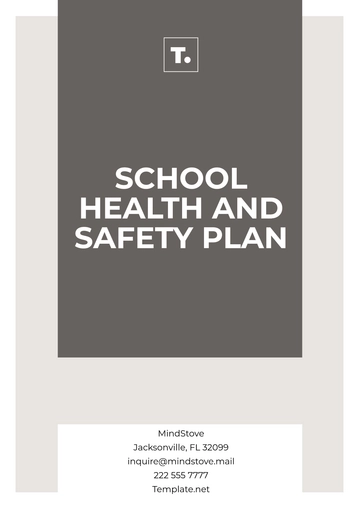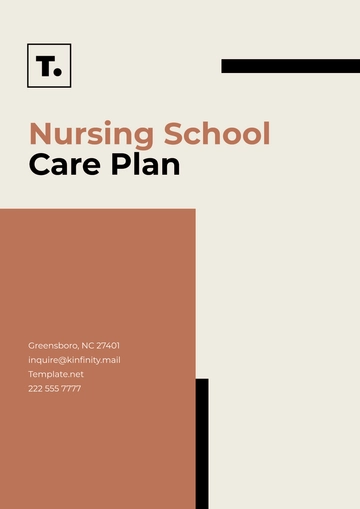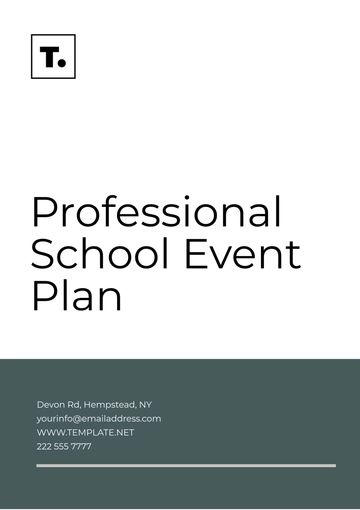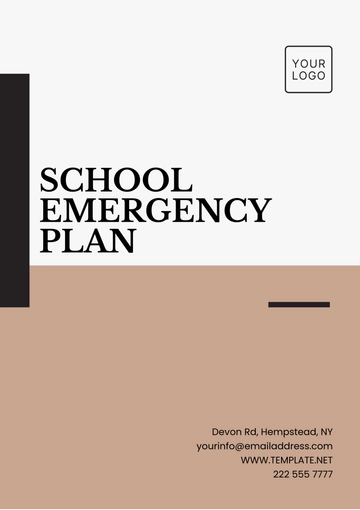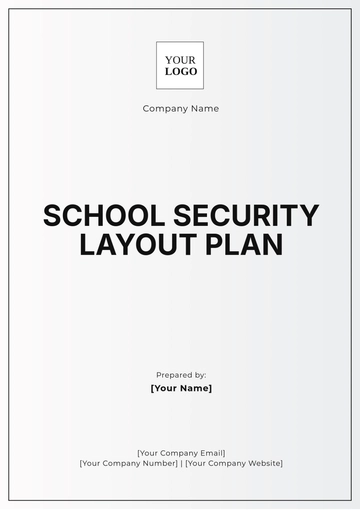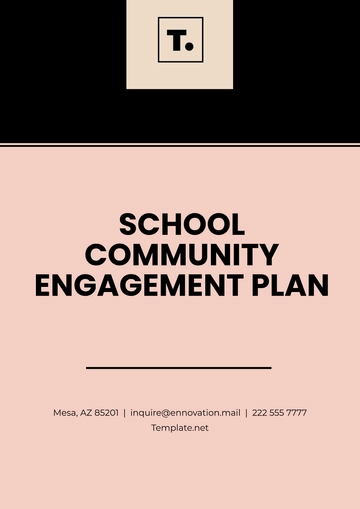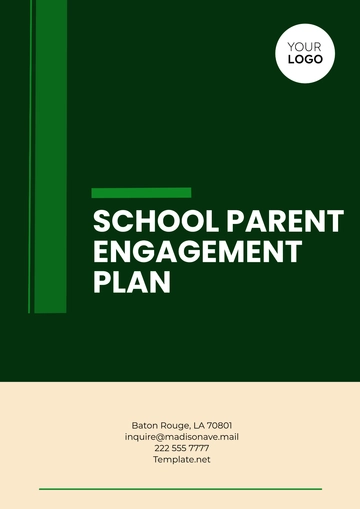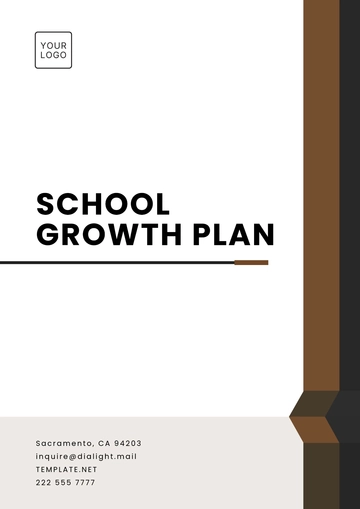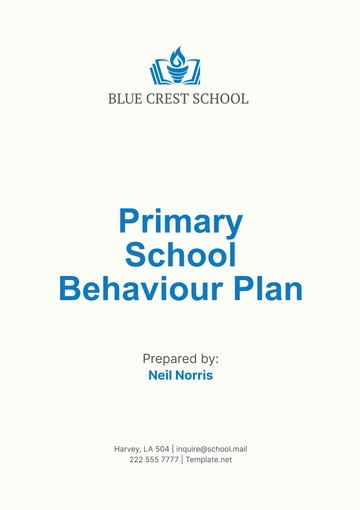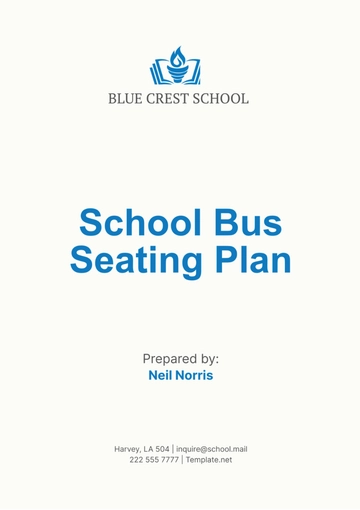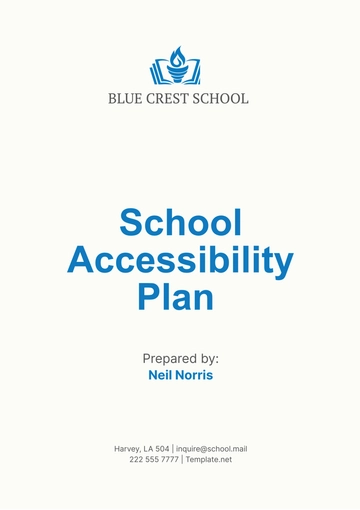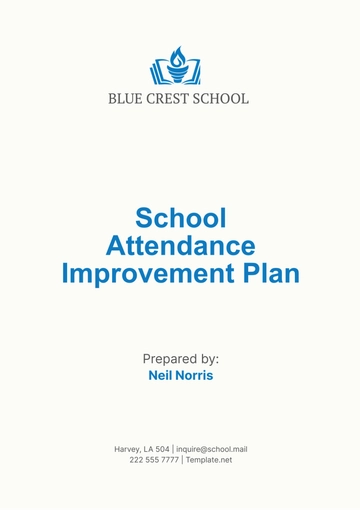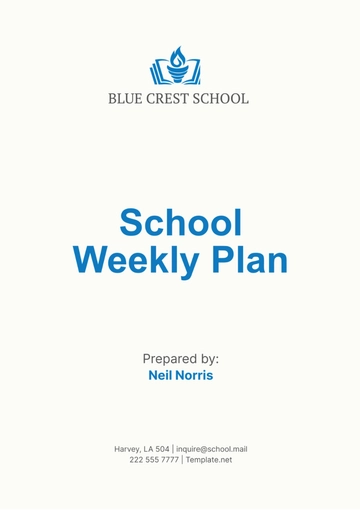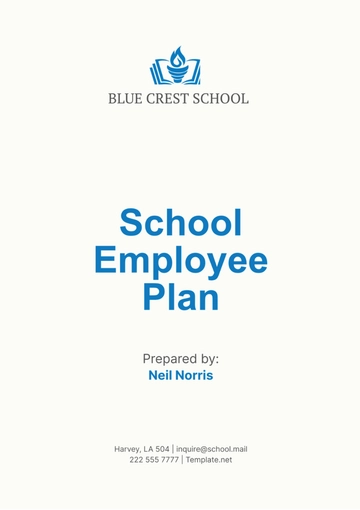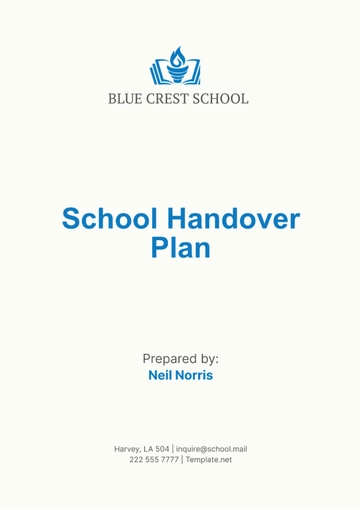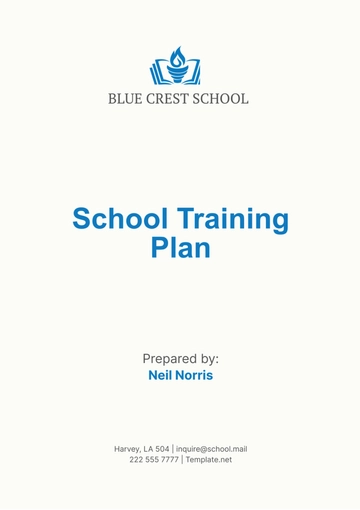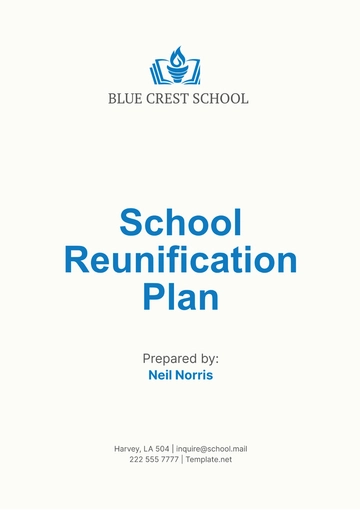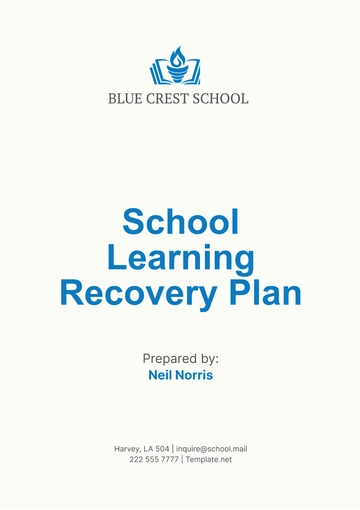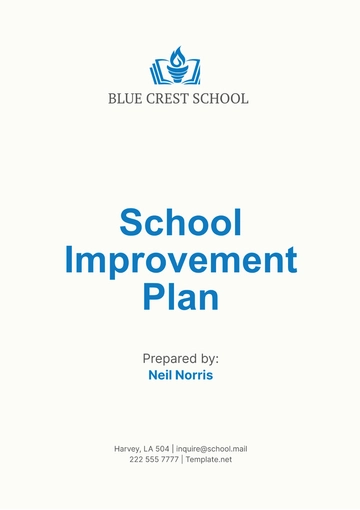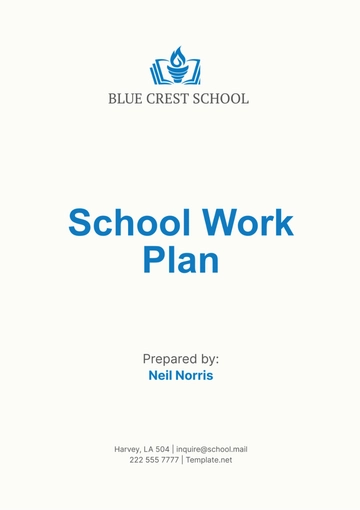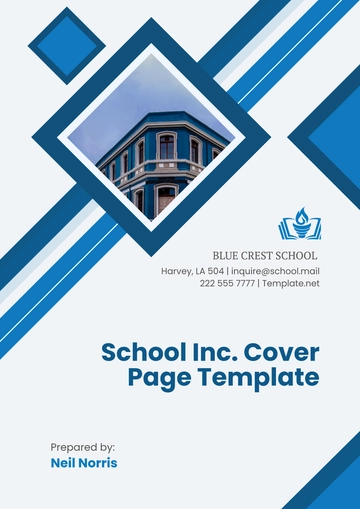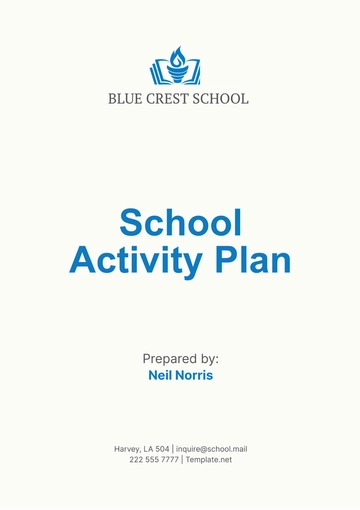Free School Monthly Plan
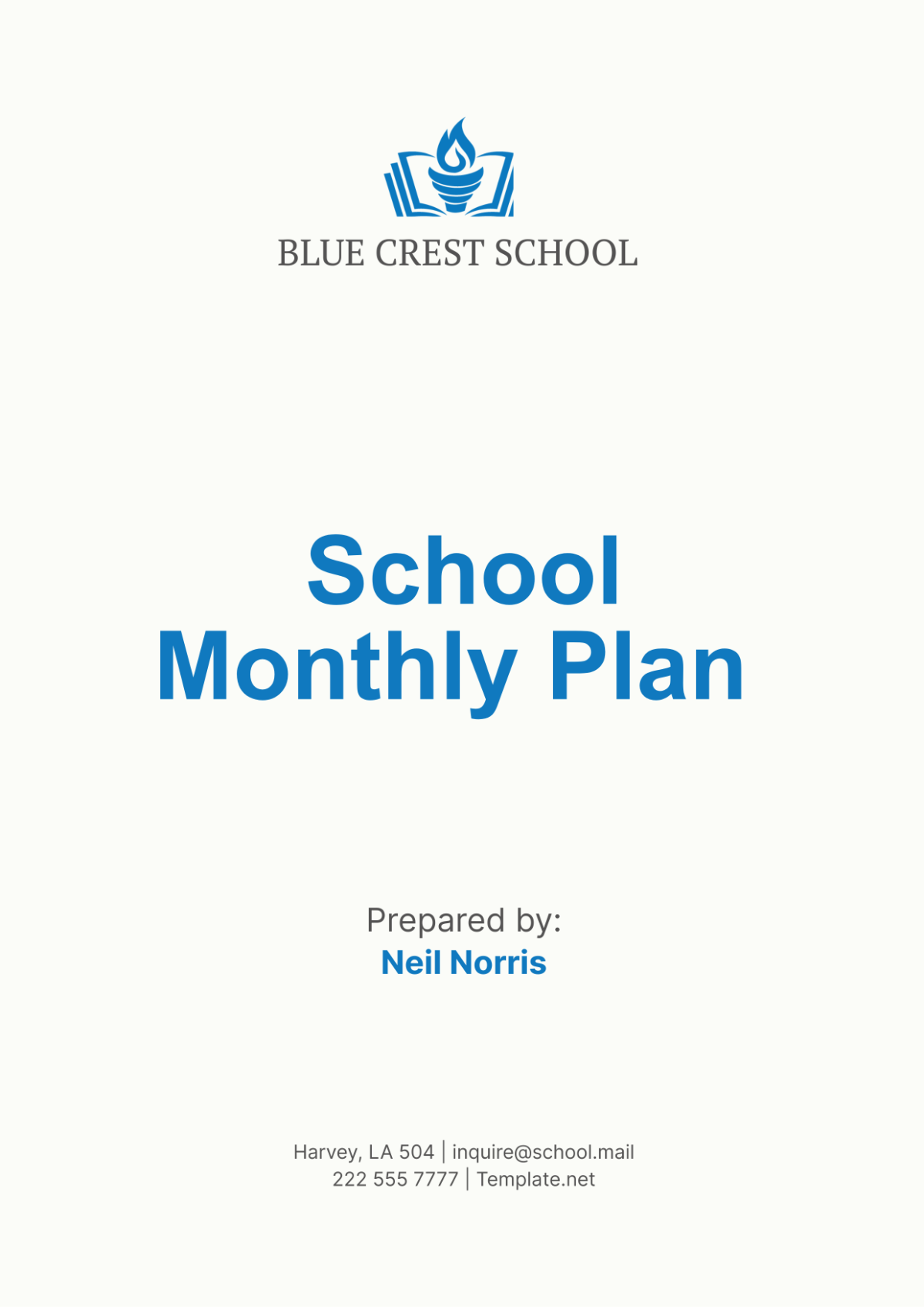
Month: January 2050
I. Introduction
The School Monthly Plan for January 2050 outlines the objectives, activities, and evaluations designed to enhance the educational experience at [Your Company Name]. This plan provides a detailed schedule of academic and extracurricular activities, resource allocations, and performance assessments to ensure that our school continues to deliver high-quality education and foster a supportive learning environment.
II. Objectives
The objectives for January 2050 are focused on improving academic performance, enhancing student engagement, and fostering community involvement. These goals align with our mission to provide a comprehensive and dynamic educational experience for all students. By setting clear and measurable objectives, we aim to ensure continuous improvement and sustained excellence in our educational programs.
A. Academic Improvement
Enhance Curriculum Delivery
Objective: Improve the delivery of the curriculum through the integration of advanced teaching methodologies and technology.
Activities:
Professional Development Workshops: Conduct regular workshops for teachers to introduce and train them in advanced teaching methodologies. These workshops will cover a range of topics, including differentiated instruction, formative assessment techniques, and the use of technology in the classroom. By equipping teachers with the latest pedagogical strategies, we can ensure that they are prepared to deliver high-quality instruction that meets the diverse needs of our students.
Interactive Teaching Tools: Implement interactive teaching tools such as smart boards, educational software, and digital resources. These tools will make lessons more engaging and accessible, allowing for a more interactive and student-centered learning experience. Teachers will be encouraged to use these tools to create dynamic lesson plans that incorporate multimedia, interactive quizzes, and collaborative activities.
Project-Based Learning: Integrate project-based learning (PBL) into the curriculum to promote critical thinking, creativity, and problem-solving skills. PBL involves students working on complex, real-world projects over an extended period, allowing them to apply their knowledge and skills in meaningful ways. Teachers will receive training on how to design and implement PBL units that align with curriculum standards and learning objectives.
Boost Student Performance
Objective: Increase student performance in standardized tests and internal assessments.
Activities:
Additional Tutoring Sessions: Provide after-school tutoring sessions for students who need extra support. These sessions will be tailored to address individual learning gaps and help students build a strong foundation in core subjects. Tutors will work closely with classroom teachers to ensure that instruction is aligned with the curriculum and focused on key areas of improvement.
Test Preparation Workshops: Offer test preparation workshops to help students develop effective study strategies and test-taking skills. These workshops will cover techniques for managing time, reducing test anxiety, and tackling different types of questions. By preparing students for the demands of standardized testing, we can boost their confidence and performance.
Data-Driven Instruction: Utilize data from assessments to inform instruction and identify areas where students need additional support. Teachers will analyze assessment data to identify trends and patterns, allowing them to target instruction more effectively. Regular data meetings will be held to discuss student progress and develop action plans for addressing identified needs.
B. Student Engagement
Promote Extracurricular Activities
Objective: Increase student participation in extracurricular activities to foster a well-rounded education.
Activities:
New Clubs and Societies: Introduce a variety of new clubs and societies that cater to diverse interests and talents. These may include clubs focused on science, technology, engineering, and mathematics (STEM), the arts, languages, and community service. By offering a wide range of options, we can ensure that every student finds an activity that sparks their interest and passion.
Inter-School Competitions: Organize inter-school competitions in areas such as sports, debate, robotics, and performing arts. These competitions will provide students with opportunities to showcase their skills, build confidence, and develop a sense of camaraderie and school spirit. Participating in competitive events also helps students learn valuable life skills such as teamwork, resilience, and sportsmanship.
Student-Led Initiatives: Encourage students to take the lead in organizing and running extracurricular activities. This can include forming new clubs, planning events, and leading community service projects. By empowering students to take ownership of their extracurricular experiences, we foster leadership skills, initiative, and a sense of responsibility.
Enhance Student Well-being
Objective: Support the emotional and mental well-being of students through targeted programs.
Activities:
Counseling Sessions: Implement regular counseling sessions to provide students with a safe space to discuss their concerns and receive guidance. School counselors will work with students individually and in groups to address issues such as stress, anxiety, and peer relationships. By providing professional support, we can help students navigate the challenges of school life and build resilience.
Mindfulness Workshops: Conduct mindfulness workshops to teach students techniques for managing stress and enhancing their emotional well-being. These workshops will cover practices such as meditation, deep breathing exercises, and mindful movement. By incorporating mindfulness into the school day, we can help students develop self-awareness, focus, and emotional regulation.
Peer Support Groups: Establish peer support groups where students can connect with others who share similar experiences and challenges. These groups will be facilitated by trained staff and will provide a supportive environment for students to share their thoughts, feelings, and coping strategies. Peer support groups can help reduce feelings of isolation and promote a sense of belonging and community.
C. Community Involvement
Strengthen Parent-Teacher Collaboration
Objective: Foster stronger relationships between parents and teachers to support student learning.
Activities:
Parent-Teacher Meetings: Schedule regular parent-teacher meetings to discuss student progress, address concerns, and set goals for the upcoming term. These meetings will provide an opportunity for parents and teachers to collaborate on strategies to support student learning and development. By maintaining open lines of communication, we can ensure that parents are actively involved in their child's education.
Parent Engagement Platform: Launch a parent engagement platform that provides parents with access to important information and resources. This platform will include features such as a parent portal, newsletters, and discussion forums. By keeping parents informed and engaged, we can foster a strong partnership between home and school.
Family-Oriented Events: Organize family-oriented events such as workshops, social gatherings, and cultural celebrations. These events will provide opportunities for families to connect with each other and the school community. By creating a welcoming and inclusive environment, we can build a sense of community and support around our students.
Increase Community Engagement
Objective: Enhance community involvement in school activities and projects.
Activities:
Community Service Projects: Partner with local organizations to organize community service projects that involve students, staff, and community members. These projects can include activities such as environmental clean-ups, food drives, and charity events. By giving back to the community, students learn the value of service and develop a sense of social responsibility.
Open Houses: Host open houses to showcase the school's programs, facilities, and achievements. These events will provide an opportunity for the community to learn more about the school and its offerings. By opening our doors to the community, we can build stronger relationships and foster support for our initiatives.
Participation in Local Events: Encourage the school's participation in local events such as fairs, parades, and cultural festivals. By taking an active role in the community, we can raise the school's profile and create opportunities for collaboration and partnership.
By focusing on these objectives, [Your Company Name] aims to create a vibrant, inclusive, and supportive educational environment that prepares students for future success.
III. Academic Schedule
The academic schedule for January 2050 includes a comprehensive plan for lessons, assessments, and special academic events. This schedule ensures that students receive a balanced and rigorous education throughout the month.
A. Weekly Lesson Plans
Week 1: January 1 - January 7
Day | Subject | Topics Covered | Activities |
|---|---|---|---|
Monday | Mathematics | Algebraic Expressions | Interactive Lecture, Group Work |
Tuesday | Science | Photosynthesis | Lab Experiment, Discussion |
Wednesday | History | Ancient Civilizations | Lecture, Documentary Viewing |
Thursday | English | Shakespearean Literature | Reading, Group Analysis |
Friday | Physical Education | Basketball Skills | Practical Session, Team Play |
Week 2: January 8 - January 14
Day | Subject | Topics Covered | Activities |
|---|---|---|---|
Monday | Mathematics | Quadratic Equations | Problem-Solving Session |
Tuesday | Science | Cellular Respiration | Lab Experiment, Group Discussion |
Wednesday | Geography | Climate Change | Lecture, Case Study Analysis |
Thursday | English | Modern Poetry | Reading, Creative Writing Workshop |
Friday | Art | Impressionist Painting Techniques | Practical Session, Art Critique |
Week 3: January 15 - January 21
Day | Subject | Topics Covered | Activities |
|---|---|---|---|
Monday | Mathematics | Geometry: Circles and Angles | Interactive Lecture, Problem Sets |
Tuesday | Science | Genetics and Heredity | Lab Work, Group Presentation |
Wednesday | History | The Renaissance | Lecture, Art Analysis |
Thursday | English | Essay Writing Techniques | Writing Workshop, Peer Review |
Friday | Physical Education | Volleyball Skills | Practical Session, Team Play |
Week 4: January 22 - January 31
Day | Subject | Topics Covered | Activities |
|---|---|---|---|
Monday | Mathematics | Trigonometric Functions | Lecture, Practice Problems |
Tuesday | Science | Ecosystems and Biodiversity | Field Trip, Research Project |
Wednesday | Geography | Urbanization and Its Impacts | Lecture, Group Discussion |
Thursday | English | Speech and Debate Techniques | Practice Speeches, Debate Session |
Friday | Music | Introduction to Music Theory | Lecture, Practical Session |
B. Assessments
Mid-Month Assessments
Date: January 15
Subjects: Mathematics, Science, English
Format: Written tests and practical assessments
Purpose: Evaluate student understanding of the topics covered in the first half of the month.
End-of-Month Assessments
Date: January 31
Subjects: All subjects
Format: Comprehensive exams and project presentations
Purpose: Assess overall student performance and understanding of the month's curriculum.
IV. Extracurricular Activities
Extracurricular activities play a crucial role in the holistic development of students. This section outlines the planned activities for January 2050, aiming to enhance students' skills, interests, and social interactions.
A. Sports Programs
Weekly Sports Schedule
Day | Activity | Coach | Time | Location |
|---|---|---|---|---|
Monday | Basketball | Coach Smith | 3:00 PM - 5:00 PM | Gymnasium |
Tuesday | Soccer | [Coach Name] | [Time] | Soccer Field |
Wednesday | Swimming | [Coach Name] | [Time] | Swimming Pool |
Thursday | Volleyball | [Coach Name] | [Time] | Gymnasium |
Friday | Track and Field | [Coach Name] | [Time] | Track Field |
Inter-School Competitions
Basketball Tournament: January 20
Soccer Match: January 25
Swimming Meet: January 28
B. Clubs and Societies
Weekly Club Meetings
Day | Club | Advisor | Time | Location |
|---|---|---|---|---|
Monday | Debate Club | Mr. Thompson | 3:00 PM - 4:30 PM | Room 101 |
Tuesday | Robotics Club | [Name] | [Time] | Lab 202 |
Wednesday | Drama Club | [Name] | [Time] | Auditorium |
Thursday | Art Club | [Name] | [Time] | Art Room 303 |
Friday | Music Club | [Name] | [Time] | Music Room 404 |
Special Events
Debate Competition: January 18
Robotics Exhibition: January 22
Drama Performance: January 29
V. Community Engagement
Community engagement initiatives are vital for building strong relationships between the school and its surrounding community. This section details the planned activities for January 2050 aimed at fostering collaboration and support.
A. Parent-Teacher Collaboration
Parent-Teacher Meetings
Date: January 10
Time: 6:00 PM - 8:00 PM
Agenda: Discuss student progress, address concerns, and set goals for the upcoming term.
Parent Workshops
Date | Workshop | Facilitator | Time | Location |
|---|---|---|---|---|
January 15 | Supporting Student Learning | Dr. Johnson | 6:00 PM - 7:30 PM | Library |
January 22 | Navigating Digital Tools | [Name] | [Time] | Computer Lab |
B. Community Service Projects
Monthly Service Initiative
Project: Community Clean-Up Drive
Date: January 17
Time: 9:00 AM - 12:00 PM
Location: Local Park
Participants: Students, staff, and community members
Ongoing Volunteer Programs
Program | Coordinator | Time | Location |
|---|---|---|---|
Tutoring Local Students | Ms. Carter | Mondays, 4:00 PM - 5:30 PM | Library |
Food Bank Volunteering | [Name] | Wednesdays, 3:30 PM - 5:00 PM | Local Food Bank |
Senior Center Visits | [Time] | Fridays, 3:00 PM - 4:30 PM | Senior Center |
C. Community Events
Monthly Events
Event: School Open House
Date: January 24
Time: 5:00 PM - 7:00 PM
Agenda: Showcase school facilities, introduce staff, and provide information on academic and extracurricular programs.
Special Celebrations
Event: Cultural Festival
Date: January 31
Time: 4:00 PM - 7:00 PM
Activities: Cultural performances, food stalls, and educational displays celebrating the diversity of our student body.
VI. Resource Allocation
Effective resource allocation ensures that the school's financial, human, and material resources are utilized efficiently to achieve our objectives. This section outlines the budget and staffing plans for January 2050.
A. Budget Allocation
Monthly Budget Overview
Category | Budget |
|---|---|
Academic Programs | $50,000 |
Extracurricular Activities | $20,000 |
Community Engagement | $10,000 |
Facility Maintenance | $15,000 |
Technology Integration | $25,000 |
Detailed Budget Breakdown
Category | Sub-Category | Amount |
|---|---|---|
Academic Programs | Curriculum Development | $20,000 |
Teacher Training | $15,000 | |
Student Resources | $15,000 | |
Extracurricular Activities | Sports Programs | $10,000 |
Clubs and Societies | $5,000 | |
Special Events | $5,000 | |
Community Engagement | Parent-Teacher Meetings | $3,000 |
Community Service | $4,000 | |
Community Events | $3,000 | |
Facility Maintenance | Repairs and Upgrades | $10,000 |
Cleaning and Supplies | $5,000 | |
Technology Integration | Smart Classroom Tools | $15,000 |
LMS Development | $5,000 | |
VR Learning Equipment | $5,000 |
B. Staffing Plan
Staffing Requirements
Position | Number of Staff | Responsibilities |
|---|---|---|
Teachers | 50 | Deliver curriculum, assess student performance, provide support |
Support Staff | 20 | Administrative tasks, maintenance, student support |
Coaches and Advisors | 10 | Manage sports programs and extracurricular activities |
IT Staff | 5 | Maintain technology infrastructure, support digital learning |
Counselors | 5 | Provide student counseling and support services |
Professional Development
Training Program | Participants | Date | Location |
|---|---|---|---|
Advanced Teaching Methods | Teachers | January 8 | Training Room |
Technology Integration in Classrooms | Teachers, IT Staff | January 12 | Computer Lab |
Student Mental Health Support | Counselors | January 15 | Counseling Center |
Leadership and Management | Administrative Staff | January 20 | Conference Room |
VII. Evaluation
Continuous evaluation is crucial for ensuring the effectiveness of our programs and activities. This section details the evaluation methods and metrics used to assess the success of our initiatives for January 2050.
A. Evaluation Methods
Surveys and Feedback
Parent Surveys: Collect feedback on parent-teacher meetings and workshops to identify areas for improvement.
Student Surveys: Gather student feedback on academic and extracurricular programs to gauge satisfaction and engagement.
Teacher Surveys: Solicit input from teachers on curriculum delivery and professional development to enhance teaching practices.
Performance Metrics
Metric | Description | Frequency |
|---|---|---|
Academic Performance | Student grades, test scores, and assessment results | Monthly |
Attendance Rates | Student and staff attendance records | Weekly |
Participation Rates | Student involvement in extracurricular activities | Monthly |
Community Engagement | Attendance and feedback from community events | Monthly |
B. Reporting
Monthly Performance Report
Purpose: Provide an overview of progress towards objectives, highlight achievements, and identify areas for improvement.
Contents: Summary of activities, performance metrics, survey results, and action plans for addressing challenges.
Distribution: Shared with school administration, teachers, parents, and community stakeholders.
VIII. Conclusion
The School Monthly Plan for January 2050 aims to enhance the educational experience for all members of the [Your Company Name] community. By focusing on academic improvement, student engagement, community involvement, and efficient resource allocation, we are committed to fostering a supportive and dynamic learning environment. We look forward to the successful implementation of this plan and the positive impact it will have on our school.
- 100% Customizable, free editor
- Access 1 Million+ Templates, photo’s & graphics
- Download or share as a template
- Click and replace photos, graphics, text, backgrounds
- Resize, crop, AI write & more
- Access advanced editor
Achieve academic excellence with ease using Template.net's School Monthly Plan Template. Effortlessly outline curriculum goals, extracurricular activities, and administrative tasks month by month. Fully editable and customizable with our AI editor tool, this template empowers educators to create comprehensive monthly plans tailored to their school's unique needs and objectives.
You may also like
- Finance Plan
- Construction Plan
- Sales Plan
- Development Plan
- Career Plan
- Budget Plan
- HR Plan
- Education Plan
- Transition Plan
- Work Plan
- Training Plan
- Communication Plan
- Operation Plan
- Health And Safety Plan
- Strategy Plan
- Professional Development Plan
- Advertising Plan
- Risk Management Plan
- Restaurant Plan
- School Plan
- Nursing Home Patient Care Plan
- Nursing Care Plan
- Plan Event
- Startup Plan
- Social Media Plan
- Staffing Plan
- Annual Plan
- Content Plan
- Payment Plan
- Implementation Plan
- Hotel Plan
- Workout Plan
- Accounting Plan
- Campaign Plan
- Essay Plan
- 30 60 90 Day Plan
- Research Plan
- Recruitment Plan
- 90 Day Plan
- Quarterly Plan
- Emergency Plan
- 5 Year Plan
- Gym Plan
- Personal Plan
- IT and Software Plan
- Treatment Plan
- Real Estate Plan
- Law Firm Plan
- Healthcare Plan
- Improvement Plan
- Media Plan
- 5 Year Business Plan
- Learning Plan
- Marketing Campaign Plan
- Travel Agency Plan
- Cleaning Services Plan
- Interior Design Plan
- Performance Plan
- PR Plan
- Birth Plan
- Life Plan
- SEO Plan
- Disaster Recovery Plan
- Continuity Plan
- Launch Plan
- Legal Plan
- Behavior Plan
- Performance Improvement Plan
- Salon Plan
- Security Plan
- Security Management Plan
- Employee Development Plan
- Quality Plan
- Service Improvement Plan
- Growth Plan
- Incident Response Plan
- Basketball Plan
- Emergency Action Plan
- Product Launch Plan
- Spa Plan
- Employee Training Plan
- Data Analysis Plan
- Employee Action Plan
- Territory Plan
- Audit Plan
- Classroom Plan
- Activity Plan
- Parenting Plan
- Care Plan
- Project Execution Plan
- Exercise Plan
- Internship Plan
- Software Development Plan
- Continuous Improvement Plan
- Leave Plan
- 90 Day Sales Plan
- Advertising Agency Plan
- Employee Transition Plan
- Smart Action Plan
- Workplace Safety Plan
- Behavior Change Plan
- Contingency Plan
- Continuity of Operations Plan
- Health Plan
- Quality Control Plan
- Self Plan
- Sports Development Plan
- Change Management Plan
- Ecommerce Plan
- Personal Financial Plan
- Process Improvement Plan
- 30-60-90 Day Sales Plan
- Crisis Management Plan
- Engagement Plan
- Execution Plan
- Pandemic Plan
- Quality Assurance Plan
- Service Continuity Plan
- Agile Project Plan
- Fundraising Plan
- Job Transition Plan
- Asset Maintenance Plan
- Maintenance Plan
- Software Test Plan
- Staff Training and Development Plan
- 3 Year Plan
- Brand Activation Plan
- Release Plan
- Resource Plan
- Risk Mitigation Plan
- Teacher Plan
- 30 60 90 Day Plan for New Manager
- Food Safety Plan
- Food Truck Plan
- Hiring Plan
- Quality Management Plan
- Wellness Plan
- Behavior Intervention Plan
- Bonus Plan
- Investment Plan
- Maternity Leave Plan
- Pandemic Response Plan
- Succession Planning
- Coaching Plan
- Configuration Management Plan
- Remote Work Plan
- Self Care Plan
- Teaching Plan
- 100-Day Plan
- HACCP Plan
- Student Plan
- Sustainability Plan
- 30 60 90 Day Plan for Interview
- Access Plan
- Site Specific Safety Plan
